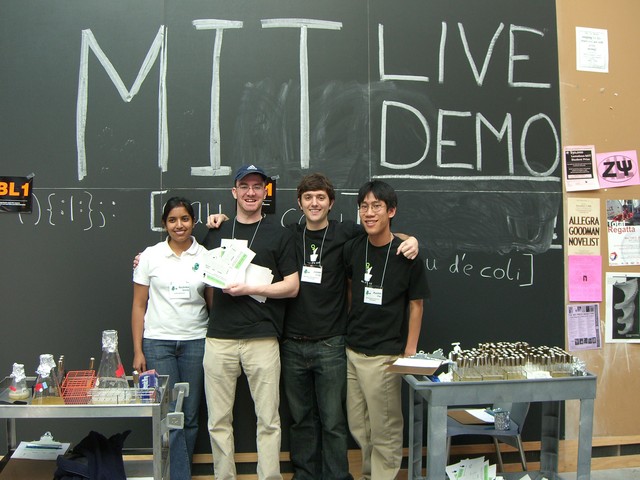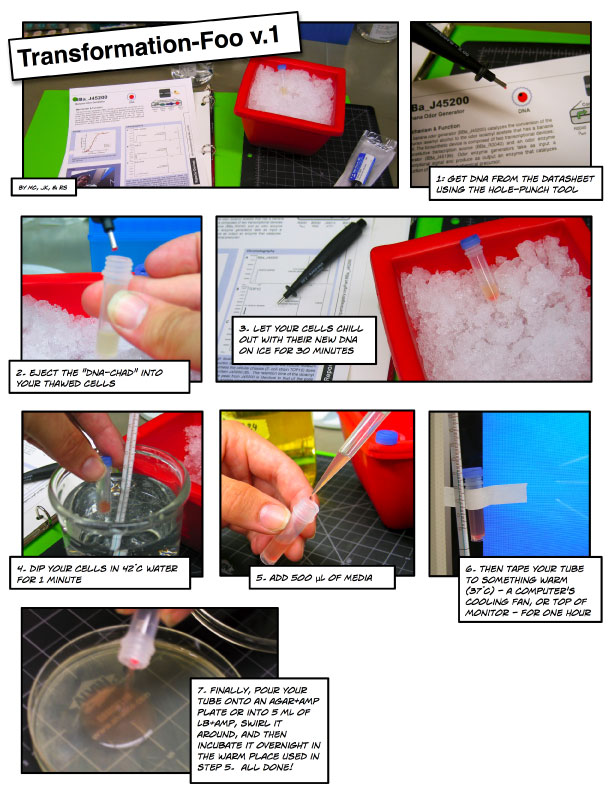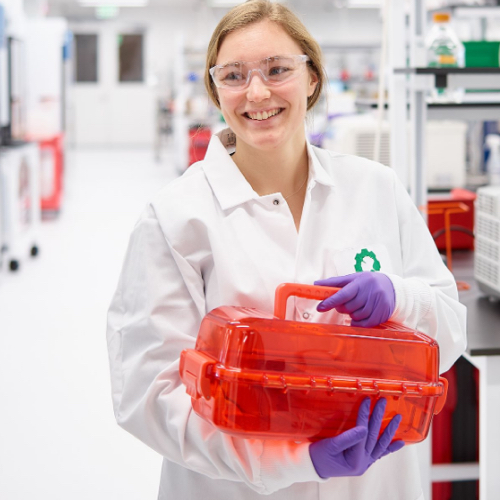 To cap an exceptional week (Gobama!), over 1000 students, advisors, and other interested parties are arriving at MIT for the annual iGEM (International Genetically Engineered Machines) competition this weekend. Over eighty teams will be presenting the results of the projects they have been working on feverishly all summer (and right up until late last night in many cases). Continue reading “One hundred and fifty pizzas”
To cap an exceptional week (Gobama!), over 1000 students, advisors, and other interested parties are arriving at MIT for the annual iGEM (International Genetically Engineered Machines) competition this weekend. Over eighty teams will be presenting the results of the projects they have been working on feverishly all summer (and right up until late last night in many cases). Continue reading “One hundred and fifty pizzas”
Category: From the Archives
Wise words for uncertain times
Tim O’Reilly on what companies should be doing during these dark economic days: “Work on stuff that matters“. Of course, this is probably good advice regardless of the economic outlook.
Tim talks about “[sensing] a storm coming” and we may actually be entering storm season with an uncertain energy future, an ever increasing world population to be fed, and an ever increasing environmental stress on the planet. These challenges are among the largest our society have faced and are going to require creative solutions on a scale we have little experience dealing with. At Ginkgo, we believe that biological technologies have the capacity to scale to address global problems. So for us “working on stuff that matters” today means developing the foundational technologies that will give society a shot at weathering the storm fronts that are just over the horizon.
Booting up your startup with govt funding
There’s been some buzz over the past few months about how to use government funding to kickstart your new business. Forbes had an article about MIT spin-out IntAct Labs getting some money from NASA and the Department of Agriculture. There was also an MIT Enterprise Forum on the topic. It makes sense … non-diluting capital is a no-brainer way to get a startup going.
What these folks don’t tell you is the hoops you have to jump through just to be eligible to apply. So here’s a quick how-to.
[Disclaimer: These are the order of steps that we’ve been able to figure out so far. We make no guarantees that the info is accurate, so use at your own risk!]
1. Form a corporation or LLC in Delaware or your home state.
2. Register to do business in your home state and city.
3. Apply for a DUNS number (takes 1 business day)
4. Obtain an employer identification number (takes 2 weeks to show up in IRS records)
5. Get a corporate bank account (can be done in an hour)
Make sure you get the EFT ABA routing number, the account number and the Automated Clearing House (ACH) point of contact at your bank.
6. Register with CCR (takes a couple of business days)
Also check out the CCR handbook.
Ginkgo goes to NEB
Recently the Ginkgo team had the pleasure of paying a visit to NEB in Ipswich, MA, and Reshma gave a talk on some of our past and current work. For those of you who’ve never heard of NEB (impossible if you’re a biologist, quite likely if you’re anything else), NEB was started in the mid-1970s and largely grew up around recombinant DNA technology. NEB is perhaps most famous for their expertise in restriction enzymes, even folks like Rich Roberts hang out there. We have long been relying on NEB’s EcoRI, XbaI, SpeI, and PstI to assemble BioBrick™* parts.
NEB is pretty unusual in that it is a privately held company that uses proceeds from its reagent business to fund basic science research. Its a nice ideal for Ginkgo to shoot for: make great tools for synthetic biology and then use those tools and the resulting resources ($$$) to go engineer cool new biological systems.
Synthetic biology is in dire need of better tools to make engineering biology easier. The challenge is not to figure out what to do but where to start. At Ginkgo, we think a lot about the engineering design cycle (design->construction->testing). We need better CAD tools for design, better parts and assembly processes to make construction faster, and better measurement techniques so that we know what’s happening with our engineered systems.
*BioBrick™ is a trademark of The BioBricks Foundation.
Ginkgo BioWorks featured in Forbes Magazine
Ginkgo BioWorks and co-founder Reshma Shetty profiled in Forbes Magazine as part of the DIY technology movement.
Bananotechnology
One of the projects that inspired us to start Ginkgo was working together as advisers to the 2006 MIT iGEM team. iGEM is the international genetically engineered machines competition and it challenges teams of undergrads to spend the summer competing to engineer the coolest biological system. If you haven’t done much molecular biology you might not appreciate how preposterous it is to suggest that novice undergrad researchers can get anything serious done in the lab in 3 months. However the MIT team of 4 freshmen and 2 sophomores managed to build a multi-gene metabolic pathway that programmed e.coli to stop smelling “like poo” (as reshma put it on NPR) and instead smell like either mint or bananas. How could they engineer a working system that fast? By using standardized DNA assembly methods and building on a pre-existing collection of standard biological parts, of course!
Horses, saddles, and microbes…
The sight of humans riding on horseback for the first time must have been a startling sight for onlookers. One wonders what those onlookers made of the event. An objective observer might have noted that the harnessing of a natural organism for personal transport was a major step forward for our species. A forward-looking observer might have predicted that we would soon be able to construct new and better horses to carry us farther, faster, and in more comfort than the horses of the day. Such hopes might have been questioned by a pessimist convinced that something as complex as a horse would never be fully understood, nor significantly improved upon.
And so it is today with Biotechnology. Continue reading “Horses, saddles, and microbes…”
It’s business time…
We’ve learnt a lot while reading the 37signals blog, both about building a great company and also about having a blog worth subscribing to. So, taking inspiration from Signal vs. Noise, we’ll share things we learn along the way about starting a company. We hope these tips will be of some use to other start-ups, especially Biotechnology start-ups seeking to grow without losing control of company direction.
We’re happy to announce that Ginkgo is now a Delaware Corporation and certified to do business in MA. Continue reading “It’s business time…”
Whatever happened to the long lazy days of Summer?
So far this summer we’ve had plenty of long days but few lazy ones. This is particularly true for one of our founders, Austin Che, who is defending his PhD thesis today at MIT. Austin has been doing some very exciting work to engineer ribozymes that can be reliably used in genetic circuits. He’ll also introduce the idea of a “transzystor” to the world. Stay tuned…
Ginkgo goes to Foo
Ok, late post here (must get better at blogging). Reshma and Barry recently attended Foo Camp in Sebastopol, CA. We had a fantastic time, even the grass we camped on was super soft! We met a very interesting group of people and got a great reception for Ginkgo.
We led two sessions. The first was a hands-on session where participants engineered E. coli to either smell like banana, glow in the dark, or turn red. Needless to say, given the attendees, most people successfully engineered their bacteria. We won’t ask where they kept their cells warm overnight! You can take a look at the instructions and parts that we gave people here (of course, the real kit had the actual DNA on each part sheet:)) People seemed genuinely excited about how easy it is to engineer your own bacteria.
We also led a session on “How to start a biotech for $100, (ok, maybe $100k)” It was great to get the perspectives of so many people from the Web2.0 field on the value of an “open stack” in enabling innovation. Web folks can quickly launch new applications built on a platform of free web servers, databases etc. They can also capitalize on a community of users that enhance the value of the product. In biotech, we can take advantage of commoditized DNA sequencing and synthesis but the upfront costs and time required to bring a biological product to market still stifle innovation. Also, there is little adoption of network effects to build a platform for technology or to add value to the adoption of a technology. Bring on Wet2.0!
It was great to hang out with Annalee from i09 (running a cool Synthetic Biology competition at the moment), and checking out Make’s home with Dale Dougherty. Oh, and meeting Ze Frank was very cool, especially learning about his Dad’s role in solving the structure of the ribosome. We’re also looking forward to reading Mez’s book “More Than Human”. Finally, our thanks to Tim O’Reilly for the invites to Foo Camp, and it was great to meet so many people from O’Reilly. Their commitment to promoting interesting technology was one of the aspects of Foo that was most striking, just a very smart, very engaged team of people.


